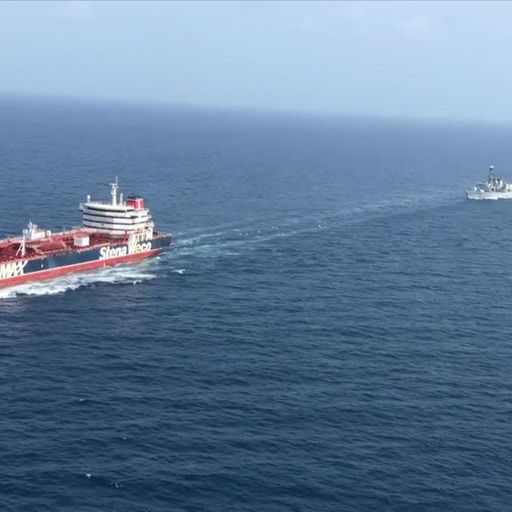Iran ambassador's apparent olive branch could ease Gulf tensions
In a rare tv interview, the ambassador offered a glimpse at what reconciliation between the UK and Iran could look like.
Iran’s ambassador in London keeps his powder dry, rarely
submitting himself to the glare of studio lights for television
interviews.
Hamid Baiedinejad chose Sky News and this week to make his first broadcast appearance since the tanker crisis in the Gulf erupted.
But his message was not bellicose. A few months ago in another recorded interview with Sky he had warned the West not to test Iran.
This time he seemed he brought to our Westminster studios what looked like an olive branch.
He of course insisted Britain and Gibraltar's seizure of the Iranian tanker the Grace 1 had been illegal and Iran's seizure of the British flagged Stena Impero entirely proper, as you would expect.
This was the mirror image of what Britain's Foreign Secretary Dominic Raab had asserted in another interview on Sky News.
Publicly available source information based on the tanker's tracking data shows the Stena Impero as in fact in Omani waters, not Iranian when it was intercepted by Iranian forces and forced to sharply reroute northwards towards Iran.
The ambassador claimed however that the tanker had entered the Strait of Hormuz via an exit channel.
"If you're driving the other side of the highway then that's a major offence."
But he was more conciliatory when asked how this crisis might be brought to an end.
The resolution of the Grace 1's detention might be able to help resolve that of the Stena Impero, he said.
Both sides have been adamant that there can be no quid pro quo swap of vessels because they are in the right, the other side in the wrong. But in this exchange the Iranians seem to be saying to the UK 'give a little on your side and we might on ours'.
There is a long way to go. The Persian Gulf is congested with more and more western naval assets. The tensions between Iran and America not in any way easing.
But a conciliatory tone from an ambassador who succumbs rarely to the temptations of a live on camera interview is not insignificant. It suggests where there is a political and diplomatic will, there may be a way in what has up to now been an ever deepening crisis.
Hamid Baiedinejad chose Sky News and this week to make his first broadcast appearance since the tanker crisis in the Gulf erupted.
But his message was not bellicose. A few months ago in another recorded interview with Sky he had warned the West not to test Iran.
This time he seemed he brought to our Westminster studios what looked like an olive branch.
He of course insisted Britain and Gibraltar's seizure of the Iranian tanker the Grace 1 had been illegal and Iran's seizure of the British flagged Stena Impero entirely proper, as you would expect.
This was the mirror image of what Britain's Foreign Secretary Dominic Raab had asserted in another interview on Sky News.
Publicly available source information based on the tanker's tracking data shows the Stena Impero as in fact in Omani waters, not Iranian when it was intercepted by Iranian forces and forced to sharply reroute northwards towards Iran.
The ambassador claimed however that the tanker had entered the Strait of Hormuz via an exit channel.
"If you're driving the other side of the highway then that's a major offence."
But he was more conciliatory when asked how this crisis might be brought to an end.
The resolution of the Grace 1's detention might be able to help resolve that of the Stena Impero, he said.
Both sides have been adamant that there can be no quid pro quo swap of vessels because they are in the right, the other side in the wrong. But in this exchange the Iranians seem to be saying to the UK 'give a little on your side and we might on ours'.
There is a long way to go. The Persian Gulf is congested with more and more western naval assets. The tensions between Iran and America not in any way easing.
But a conciliatory tone from an ambassador who succumbs rarely to the temptations of a live on camera interview is not insignificant. It suggests where there is a political and diplomatic will, there may be a way in what has up to now been an ever deepening crisis.


